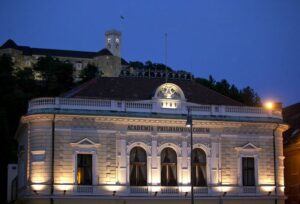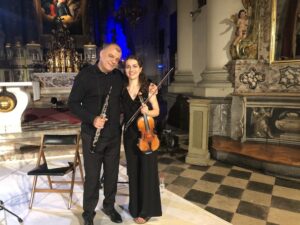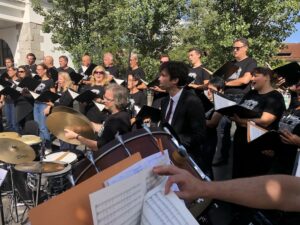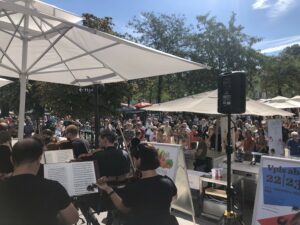We Are Not As “Instant” As We Like to Reproach Ourselves
May 21 2023
Before I met Matej Šarc, the director of the Slovenian Philharmonic, I imagined a man staring into a score and listening to me distractedly, but our first meeting was something else altogether. It started with the best coffee in Ljubljana – which he made for me himself – and a conversation about social networks and how important it is to be present in the digital world today. If I add that the conversation took place in the building of the Slovenian Philharmonic, which is one of the most beautiful and oldest buildings in Ljubljana, then I can say that Matej is a bridge between what was and what will be. Reconciling the deep roots and history of the Philharmonic with the young generation of listeners, taking into account and respecting the old while being interesting for everyone and on all channels, is not exactly a piece of cake. But the vision is the right one, and Mr Šarc is the right man in the right place: he convinced me completely.

When I think about music and about a philharmonic anywhere in the world, I’m always struck by the feeling that everywhere there is an incredible history, which of course also has a certain weight. On the other hand, we live in modern times, we want to have everything immediately, here and now. Is it hard to reconcile everything that was and still is important with the current situation, which is just as fascinating?
If I understand correctly, you are asking me about reconciling the incredible history of the philharmonic(s) with the modern age, in which we want to have everything immediately, here and now. I would say this: we don’t need to mystify and glorify the weightiness of the past, while at the same time being disapproving (or enthusiastic – whatever you want) about modern man’s desire to have everything immediately, here and now. For instance, the famous opera composer and extraordinary chef Gioachino Rossini was so popular that opera theatres eagerly awaited his new operas and were very impatient to receive them. Sometimes the musicians were in such a hurry that they stood under his window and Rossini threw freshly written opera arias out of the window as he finished them. The musicians caught the sheet music and immediately ran off to practise, as the premiere of the opera was almost upon them. Not least, Mozart was pressed for time when he wrote his famous Requiem, and the commissioning party relentlessly urged him to hurry. On the other hand, I think that even in today’s times we are not as “instant” as we like to reproach ourselves. Today, we simply take advantage of modern technologies that deliver information quickly to our palm, and from there to our head, or perhaps not. I’m convinced that people have always liked to take their time over really important things, both in the past and today. It is true, however, that these days we very quickly gloss over thousands of irrelevant or insufficiently important pieces of information that the same technologies constantly push in front of our noses. We have to be really quick if we want to avoid them. Even today, however, we certainly like to take the time for those we love, we still like to enjoy good food, concerts and theatre performances, we still go to museums when we travel; in short, the time we live in is not that terrible.

You are a musician who plays quite a few different instruments. Do you still find time for yourself, to play or create music?
If I didn’t, my answer to the first question wouldn’t be credible. Of course, I still find time to play the oboe, to play with friends and to teach. It’s true that I have much less time for this than when I played the oboe in the Slovenian Philharmonic Orchestra. As the director, I have to be available every day to the 153 employees of the Slovenian Philharmonic and to many interlocutors: guest conductors, soloists, agents, media, external contractors and representatives of related cultural institutions. Nonetheless, I still like to find time to make music.
What are the needs and wishes of visitors to the Philharmonic today? What do they expect when they come to you? Have their expectations changed over time (and, of course, also after Covid)?
Visitors to the Slovenian Philharmonic tell me that they want to spend a good two hours at a concert and nourish their soul with quality music that they like. By listening to this music, they want to relax and gain the spiritual strength that we all need on a daily basis. Just like any other artform, music is multifaceted. It deals with a wide variety of mental states. Sometimes it’s absolute and it doesn’t evoke specific emotions, thoughts or metaphors in the listener at all. Other times it’s joyous, powerful or stimulating, but it can also be depressed, melancholy or aggressive. It’s everything that our world is. The combination and intertwining of all of these moods reflects our everyday life, thus reminding us that our everyday life is not just “that happy day”, but it’s not the end of the world either.
How many young people are present in the Philharmonic? How many come to the concerts?
The most pleasant surprise of the post-Covid period has been the greatly increased interest of young people in the concerts of the Slovenian Philharmonic. Their interest in contemporary music is growing particularly fast. This music can mainly be heard at the concerts of subscription series MVP – Mainly Vocal Programme, and NOW – New Orchestral Works. Young people find this music different and very interesting. They listen to it unburdened and with a great deal of enthusiasm. That’s why the atmosphere at these concerts is really special.

The collective of the Slovenian Philharmonic seems very harmonious, very friendly. How important are human relationships when it comes to making things really flow? Is this your second family?
The Slovenian Philharmonic is the second family of every employee. You know, in art you can’t be “at work”. You can only be in the service of art; in our case, in the service of musical art. And you can only serve art if you are passionately and completely committed, if you put everything you have into the performance of each composition, all of your knowledge, hours and hours of individual preparation, hours and hours of joint rehearsals, as well as alignment, submission and adaptation to the will of composers, conductors and section leaders. All of this is extremely tiring and requires one to surpass oneself again and again. Interpersonal relationships are therefore extremely important. Each musician is highly educated, but at the same time, due to the dedicated performance of music, each one is completely open, exposed, and thus also extremely vulnerable. But it has to be like this, as art can only arise under these circumstances. If it wasn’t like this, the Philharmonic would be just an ordinary “factory” or “shop”.
Spring and summer are undoubtedly a time when we all like to go to concerts, socialise and enjoy good music. What do you have in store?
The regular subscription season of the Slovenian Philharmonic takes place from September to June, so the extremely successful 2022/23 season is slowly drawing to a close. We’ll perform just a few more subscription concerts, as well as a spectacular concert among the cargo cranes in the Port of Koper, an event called the Koper Symphony. But we’ll have some more fun on three Saturday mornings – 27 May, 3 and 10 June 2023 – when we’ll perform at the Ljubljana Market, where the Slovenian Philharmonic Choir and Orchestra will present a lively programme to passers-by. The events will be moderated by Tilen Artač in his familiar way. There we will present the new 2023/24 concert season and sell subscription tickets. So I warmly invite everyone to spend these Saturday mornings at the market in the company of the Philharmonic and fill your shopping baskets with fresh treats, as well as with our subscriptions for the coming season.
